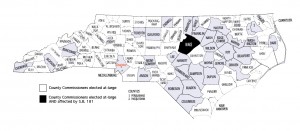A bill the N.C. Senate recently passed to redistrict and alter Wake County Commissioners elections has one word surrounding its controversy: gerrymandering.
“[The bill] is nothing but a purely partisan power-grab,” said Perry Woods, a political consultant who has worked on the four newly elected county commissioners’ campaigns and for the Wake County Democratic Party as Caucus Director, helping to coordinate all county-wide elections.
The Commissioner redistricting bill (S.B. 181) completely alters how commissioners are elected in Wake County. For the most recent election, and those before it, every seat was elected at large, though members had to live in their district, and the elections were staggered to keep a portion of the board after every election, preserving institutional memory.
S.B. 181 drastically changes the board. With the new districts, members are elected from seven districts and two at-large seats, the latter drawn as one rural district and one urban district. In the 2016 election, the current districts will still apply, but the elected members’ terms will only last two years. In 2018, every seat will be up for election under the new plan.
In the most recent election, Democrats took the Commission in a 55-45% vote. Under the new districts, that same election would have gone 5-4, with a Republican majority.
The recent history of Wake County redistricting is somewhat complicated and indicative of the bill’s controversy.
“When the Republicans took over the School Board in 2009, they paid a private consultant–a republican lawyer… $25,000 to draw new districts. He drew new districts that were gerrymandered to help the Republicans somewhat, but they were still compact and contiguous and kind of represented somewhat what the old districts looked like. Then the Democrats ran and beat them in the districts they drew,” said Woods.
Then, in 2013, the General Assembly got involved; Senator Chad Barefoot (the sponsor of S.B. 181 as well) and other N.C. Senate Republicans redrew Wake County School Board districts. And at the beginning of this legislative session, Barefoot began pushing a bill to apply those redrawn school board districts to Wake County Commissioner elections.
Barefoot has cited amending expensive county-wide campaigns and better representing rural Wake County as motivation for the bill, but Angie Scioli wonders why past measures did not aim to fix these problems, if Wake County’s district flaws were inherent and obvious.
“[Lowering campaign costs] does not seem to have been a priority for the Republican [County Commissioners] who held the majority when the districts were redrawn in 2011, or when school districts in Wake County were changed last year,” said Scioli at a hearing on the bill open to the public.
In fact, as Scioli says, County Commissioner campaign cost reform, though a noble goal, could not only affect Wake County. If the at-large elections lead to expensive campaigns, Wake is certainly not alone; out of 100 counties in North Carolina, 66 elect all of their commissioners at-large.
Additionally, although Barefoot cites an effort to better represent rural Wake County residents, including his constituents, due to Wake’s increasing population and Raleigh’s urban center–supposedly well-demonstrated by Districts A and B, the large rural and urban districts–eight of the nine new districts contain some part of Raleigh, and, based on how some districts are drawn, a Commissioner living in Morrisville could represent someone living in Zebulon.
The bill also aims to improve diversity on the Board, despite that the most recent election replaced four white men to create what Woods sees as a remarkably diverse Board of Commissioners.
“Two [members] under 35. Two African Americans. Three women. Four men. The County Commission now looks like Wake County,” Woods said.
Barefoot represents a sliver of eastern Wake and all of Franklin County, one of the 44 counties that do not elect commissioners at-large.
The potential upheaval of every commissioner seat puts an important facet of county governance at risk: institutional memory.
Staggered elections keep experienced members on the board as newly elected members transition. Institutional memory refers to every lesson learned by experienced members that remains a part of decision-making, even after those experienced members eventually leave, because members passed the lessons, the knowledge on.
The Wake County School Board, under the new districts in 2016, certainly learned from the recent snow makeup days debacle, similar to how the Board learned after students lost weeks of school to hurricane Fran in 1996. Since Fran, the board has included makeup days in the first semester–a result of past wisdom the Board handed to each generation of members. Due to the bill’s potential damage to institutional memory, lessons from the snow days may not influence future board policy as easily.
Elections will also be complicated by how the districts were drawn, according to Woods. The districts separate many precincts, leading to a need for different types ballots for each precinct and greatly increasing election administration costs.
Governor Pat McCrory opposes the redistricting bill, although he cannot veto it due to its future as session law, should it pass, and expressed this opinion in an interview with the News & Record: “Let me put it this way: As governor I constantly have to fight Washington not to interfere. I think the same philosophy applies to Raleigh interfering with local governments.”
Editor’s Note: S.B. 181 passed on Monday and is now Session Law 2015-4.

Leave a Reply